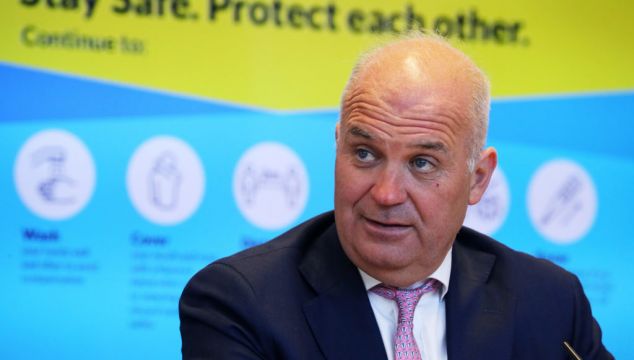Health officials have urged people to reduce their socialising amid a big rise in Covid-19 cases.
The stark message came as health officials said that socialising had returned to levels not seen since the pandemic began.
Chief medical officer Dr Tony Holohan said individuals should scale back the number of people they are meeting. “That will mean cutting contacts,” he told a press briefing.
“Perhaps it’s not what people want to hear. It’s not something I want to be telling people,” he added.
He called on people to “ration the kinds of discretionary activity you might undertake”.
“If we can have most of the people observing most of the measures most of the time, that will make a huge difference.”
It comes as a further 3,174 cases of Covid were reported in the Republic on Wednesday, the National Public Health Emergency Team (Nphet) confirmed.
There are 460 Covid-positive patients in hospital, including 86 in intensive care.
A further 56 deaths were newly notified in the past week, bringing the total number of Covid deaths in the State to 5,492.
Dr Holohan said Nphet was not currently considering recommending that the Government introduce fresh restrictions.
“For now, the question of restrictions is a hypothetical one,” Dr Holohan told reporters.
He noted that incidence was "increasing rapidly" in young adults aged 19-24 and across all adult age groups up to those aged 75.
The chief medical officer stopped short of telling people to avoid nightclubs, stressing instead that cases were too high among all segments of the population and that no one activity could be blamed.
He asked people to be more careful and to cut down on “high-risk activities”.
Epidemiologist Professor Philip Nolan said there were only two weeks since the start of the pandemic when the number of cases reported was higher.
He warned that there was no way to guarantee cases would peak in the next few weeks, and that it was impossible to say precisely when cases might peak and start to fall.
Prof Nolan said that some models showed that case numbers might peak in late November or early December.
However, he said that other models showed that the peak could happen later this year and case numbers may be slower to decline.
“It is very hard to say,” Prof Nolan said.
Pressure on health system
Earlier, a senior health official said the hospital system was currently able to cope with the surge in Covid-19 cases.
Chief clinical officer in the HSE, Dr Colm Henry, said the recent rise in coronavirus cases was causing pressure on the health system.
However, he stressed that the situation would be significantly worse if Irish people did not have the protection provided by the Covid vaccine.
“We’re seeing a surge in cases,” he said on Wednesday.
“That’s clearly causing its own strains and pressure because it’s happening at a time in winter when other viruses are circulating and we’re beginning to see our first cases of influenza, albeit in small numbers.”
The 14-day incidence now stands at 695 per 100,000, an increase of 18 per cent on last week, according to Nphet.
Minister for Health Stephen Donnelly said on Tuesday that he is not currently contemplating reintroducing restrictions to stem the spread of Covid-19.
Dr Henry told RTÉ radio on Wednesday: “We’re seeing that firewall, that floodwall, of vaccine protection hold tight for the large part.”
“The harm that it is converting into is much lower than it was in January.”
“Vaccines alone will not prevent the spread of infection and vaccines alone will not prevent serious illness if enough people become infected,” he warned.
While some hospitals have been forced to make cancellations amid growing pressures, Mr Henry said that that system is currently coping.
However, he warned that extra capacity was not “indefinite”.
“That intensive care capacity is not indefinite, in terms of its ability to absorb all the pressures that are being heaped upon it.”
Earlier this week, the National Immunisation Advisory Committee (Niac) recommended that booster jabs be rolled out to healthcare workers.
Dr Henry said that the booster programme for doctors, nurses and other healthcare staff will begin in the coming days and will take around six weeks.







